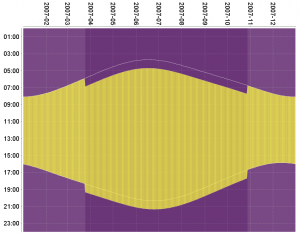Precious, Precious Daylight

Tomorrow, after-work or after-school activities that require daylight come to an abrupt end for most of us in the US and Canada. (Remember to “fall back” tonight!)
There seems to be a lot of misdirected vitriol surrounding daylight saving time (DST). First, let’s get this out of way: no one (worth arguing with) thinks daylight saving time [1] literally saves daylight. (I would’ve said that no one worth arguing with even thinks that anyone thinks that, but people arguing against DST keep dragging out that straw man. “The sun doesn’t care what we do with our clocks!” they cry. Debates don’t tend to be productive when one side thinks the other are imbeciles.) The actual debate is about how or whether to shift our schedules to make the best use of daylight. I’m starting with the assumption that it is both energy inefficient and socially inefficient to waste daylight hours asleep. So as the days get longer, you want to start the day earlier. The point is to shift our schedules to stay in sync with the sun. If you’re in the middle of your timezone and as far from the equator as London then night and day look like this:

(With a different x-axis for the southern hemisphere, but the southern hemisphere isn’t so into DST.)
As the diagram makes clear, the value of DST is the value of having daylight at 8pm instead 5am, roughly. Sure, we could change business hours and train schedules and whatnot to be earlier during the summer months, but changing the clocks twice a year is easier than that. Realistically, we’re just not going to start waking up earlier to take advantage of the increased daylight. Unless we trick ourselves into doing so by changing the clocks.
I view daylight savings time as a clever hack to circumvent an otherwise intractable coordination problem: getting everyone to shift their schedules to not waste all that extra morning daylight.
Addendum: We can’t abolish time zones either
Many techie types fantasize about abolishing both daylight savings time and time zones. “Let’s use UTC [universal coordinated time, aka GMT] everywhere,” says Matt Rudary, echoing a sentiment I hear a lot in the circles I hang out in. “I have no problem working 14-22 instead of 9-5.” That would be convenient in a lot of ways, but I think Matt underestimates the power of focality. This is what I predict would happen if both time zones and DST were scrapped:
Everyone in what used to be the eastern time zone would settle on 14-22 as standard business hours. (And similarly for every other time zone — just make the one-time conversion to figure out what the old business hours are called in the new system.) We’d then need DST as much as ever because there would be no hope of shifting standard business hours earlier in the summer to make better use of the extra early-morning daylight.
Note that it doesn’t even matter if most people’s jobs are flexible enough not to care about standard business hours. There will still be a too-sizable minority that will balk at having softball practice (or whatever) at what we now call 4:30pm on a weekday. But rename 4:30 to “5:30” and everyone’s fine with it. And for good reason. Because it’s all about coordination. We can’t shift standard business hours unless we all do it in sync. I’m not sure anything but DST could do that. Maybe something like DST but more fine-grained, or even continuous, in the not-too-near future when all clocks are computerized.
Illustration by Kelly Savage.
Footnote:
[1] You know what? Screw it. “Daylight savings time” just sounds much more natural to me. Suck it, Prescriptivists.
